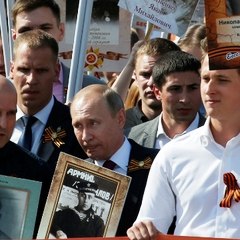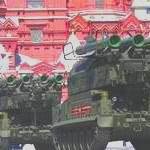(CSM) Sofia Serbinenko was on the streets of Moscow with about 800,000 other marchers Monday, carrying a beribboned photograph of her great-grandfather, a Soviet fighter-bomber pilot who fought the Nazis in World War II.
"Victory Day has always been very important in our family," says Sofia, an 8th grader. "I have read so many books about the war, and I think all the time about the people who died so that we could live. For me, with a good life today, it is only right to declare that I will always remember, and to express my gratitude." […]
"Victory Day is practically the only 20th century event that all Russians, from every part of the political spectrum, can agree upon," says Nikolai Petrov, a professor at Moscow's Higher School of Economics.
"Now the Kremlin is emphasizing the glorious Soviet past. But when you examine that past, almost every episode evokes controversy. All that we actually have is the victory over Naziism, and maybe Yuri Gagarin, the first man in space. So, a big part of Victory Day is about official myth-building."
"The anti-Nazi victory is a great source of pride for our people, and legitimacy for our state, at a time when there is quite a lot of uncertainty," says Mr. Petrov. "So, the idea is to take every opportunity to celebrate it."
Read More © Christian Science Monitor










